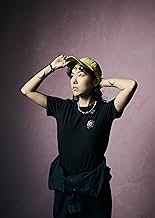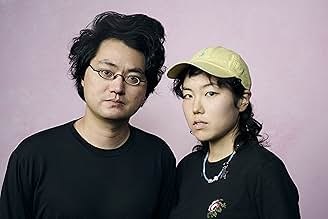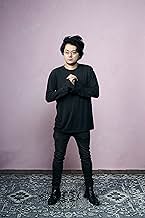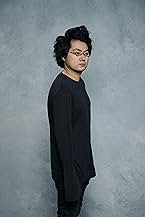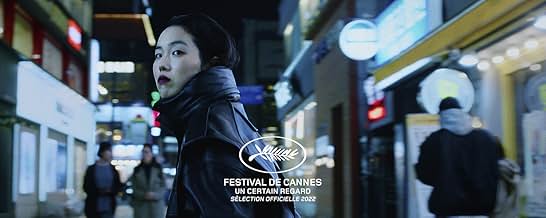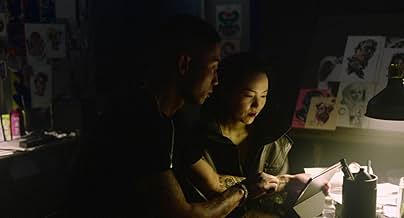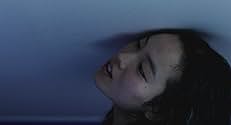VALUTAZIONE IMDb
6,9/10
10.006
LA TUA VALUTAZIONE
Una donna francese di venticinque anni torna in Corea, il paese in cui è nata prima di essere adottata da una coppia francese, per la prima volta. Vuole rintracciare i suoi genitori biologic... Leggi tuttoUna donna francese di venticinque anni torna in Corea, il paese in cui è nata prima di essere adottata da una coppia francese, per la prima volta. Vuole rintracciare i suoi genitori biologici, ma il viaggio prende una svolta sorprendente.Una donna francese di venticinque anni torna in Corea, il paese in cui è nata prima di essere adottata da una coppia francese, per la prima volta. Vuole rintracciare i suoi genitori biologici, ma il viaggio prende una svolta sorprendente.
- Premi
- 10 vittorie e 25 candidature totali
Heo Jin
- Grandmother
- (as Jin Heo)
Régine Vial
- Gisèle Benoît
- (as Régine Vial Goldberg)
Shin Dong-ho
- Tena's Father
- (as Dong-ho Shin)
Recensioni in evidenza
I saw this film yesterday and I thought that it's an original and unique film, but somewhat difficult to enjoy. An issue that many people have is that they can't connect to Freddy, the main character, and I get why. Her behaviour is often erratic, and then at times repelling and harsh to others. As she really takes centre stage in this film, it can be hard even for the spectator to put up with her behaviour, even though it is nowhere near outright evil. I thought a bit more about this, and will share my view of it. I won't reveal any detail of the film that you can't find in any generic introduction, so no spoilers, however if you want to watch this and build your own understanding unaffected by my interpretation, you may not want to read on.
I actually know well a person in a similar situation to Freddy, somebody from outside Europe who was adopted to Europe at the age of half a year. There are clear parallels also in behaviour. Being abandoned is a primal experience for adopted children. In these cases an additional thing is that the environment can clearly see that the parents are not the biological parents, and some may think the child "doesn't belong" in the country to where it was adopted. This will add to their experience of being somewhat odd and maybe not really accepted, even though the adoptive parents themselves may not convey anything of that kind. What I see in Freddy is a very strong tendency to keep up and defend her own independence fiercely, particularly if somebody else gets closer. The biological parents have given her away, so it is hard to handle and accept for her if she meets them again and they want some closer contact. I think there is much fear of being abandoned again involved. She may also have tried extra hard to become a proper French person when growing up, potentially facing some prejudice but also encouragement there, and she may identify South Korea as a place that abandoned her, even though there is also curiosity and a certain feeling of connection that she has difficulties allowing for herself. So she develops this rather ambivalent relationship to South Korea and the people there, sometimes behaving extra strange, sometimes getting closer, then again wanting to run away when indeed somebody gets a bit closer. There may also be an element of trying to prove life wrong, trying to show to herself that ultimately she isn't rejected by South Korea and her biological parents, but with a lot of suspicion and self protection at the same time. So thinking about this a bit longer, ultimately her behaviour makes a lot of sense to me, even in its superficial inconsistency.
So after a day I think this is actually very well done and convincing, and I'll give it 8 stars, even though I hadn't felt like that yesterday when the film ended. Note, explanations are not normally given in the film. She does what she does but she really isn't communicative about her motives, so we can only speculate. But it makes all sense to me, given also my personal knowledge of such a person.
I actually know well a person in a similar situation to Freddy, somebody from outside Europe who was adopted to Europe at the age of half a year. There are clear parallels also in behaviour. Being abandoned is a primal experience for adopted children. In these cases an additional thing is that the environment can clearly see that the parents are not the biological parents, and some may think the child "doesn't belong" in the country to where it was adopted. This will add to their experience of being somewhat odd and maybe not really accepted, even though the adoptive parents themselves may not convey anything of that kind. What I see in Freddy is a very strong tendency to keep up and defend her own independence fiercely, particularly if somebody else gets closer. The biological parents have given her away, so it is hard to handle and accept for her if she meets them again and they want some closer contact. I think there is much fear of being abandoned again involved. She may also have tried extra hard to become a proper French person when growing up, potentially facing some prejudice but also encouragement there, and she may identify South Korea as a place that abandoned her, even though there is also curiosity and a certain feeling of connection that she has difficulties allowing for herself. So she develops this rather ambivalent relationship to South Korea and the people there, sometimes behaving extra strange, sometimes getting closer, then again wanting to run away when indeed somebody gets a bit closer. There may also be an element of trying to prove life wrong, trying to show to herself that ultimately she isn't rejected by South Korea and her biological parents, but with a lot of suspicion and self protection at the same time. So thinking about this a bit longer, ultimately her behaviour makes a lot of sense to me, even in its superficial inconsistency.
So after a day I think this is actually very well done and convincing, and I'll give it 8 stars, even though I hadn't felt like that yesterday when the film ended. Note, explanations are not normally given in the film. She does what she does but she really isn't communicative about her motives, so we can only speculate. But it makes all sense to me, given also my personal knowledge of such a person.
Return to Seoul is an ambitious film, telling the story of a young woman named Freddie, who was born to Korean parents, but grew up in France. She - you guessed it - returns to Seoul, partly motivated to search for them, in her early to mid-20s. From there, the movie plays out sort of the way you'd expect for a while... until it makes some interesting narrative decisions, spanning far more time than I'd expected it would. As such, we get an insight into Freddie and the ways she changes throughout her 20s and into her early 30s.
Tonally, it's very different from The Worst Person in the World, but I got flashes of that film from this; maybe it scratched a similar itch. Each looks at a troubled & flawed, yet interesting, compelling, and sympathetic young protagonist, each spans quite a long period of time, each explores loneliness and the trials and tribulations of early adulthood in a very hard-hitting way, and each is quite visually striking. But like I said, they're tonally different, given Return to Seoul is more of a straightforward drama than a romantic-dramedy, and it gets darker and more in-depth with its exploration of loneliness (which hits extra hard, given what the world's been through since the start of the 2020s).
It's not always clear where the film is going, and some of the decisions it makes are quite jarring (though most work for the story and characters, once the shock wears off). The pacing is quite slow, but the compelling main character, the visually pleasing look of the film, and the amazing acting kept me engaged for almost all of its two-hour runtime. Park Ji-Min gives one of the best performances of 2022, and I was shocked to read this is her first ever movie. A performance like this that's so central makes or breaks this kind of character-focused film, and thankfully, she's up to the task and then some.
This might not be everyone's cup of tea, but I liked it a lot. While it was deliberately-paced, it never lost me, and I found some of the scenes quite moving. It's a very good movie; hopefully it won't go under too many people's radars, as Awards Season ramps up.
Tonally, it's very different from The Worst Person in the World, but I got flashes of that film from this; maybe it scratched a similar itch. Each looks at a troubled & flawed, yet interesting, compelling, and sympathetic young protagonist, each spans quite a long period of time, each explores loneliness and the trials and tribulations of early adulthood in a very hard-hitting way, and each is quite visually striking. But like I said, they're tonally different, given Return to Seoul is more of a straightforward drama than a romantic-dramedy, and it gets darker and more in-depth with its exploration of loneliness (which hits extra hard, given what the world's been through since the start of the 2020s).
It's not always clear where the film is going, and some of the decisions it makes are quite jarring (though most work for the story and characters, once the shock wears off). The pacing is quite slow, but the compelling main character, the visually pleasing look of the film, and the amazing acting kept me engaged for almost all of its two-hour runtime. Park Ji-Min gives one of the best performances of 2022, and I was shocked to read this is her first ever movie. A performance like this that's so central makes or breaks this kind of character-focused film, and thankfully, she's up to the task and then some.
This might not be everyone's cup of tea, but I liked it a lot. While it was deliberately-paced, it never lost me, and I found some of the scenes quite moving. It's a very good movie; hopefully it won't go under too many people's radars, as Awards Season ramps up.
Return to Seoul: A stranger in a strange land, adopted as a bay from South Korea and raised in France, 25 year old Freddie (Ji-Min Park) returns. It is a bit of a culture shock but she quickly makes friends. She is persuaded to contact her birth parents through the adoption agency and eventually her father responds. All does not go swimmingly especially as Freddie's free spirit clashes with Korean reticence and patriarchal norms. Freddie herself however is self-centred and even cruel to friends and family. The film captures snapshots her life for her first two weeks as an returnee in Korea, two years later, five years after that and finally a year later, eight years since her first return visit. She develops in some ways, degenerates in others. An interesting tale of loss, acceptance, search for identity and longing on the part of Freddie. Directed and written by Davy Chou. 8/10.
What stands out the most about this film is its refusal to take the easy route. While viewers may think they can predict the direction after the first act, they are mistaken. The narrative defies predictability, mirroring the unpredictable nature of wounded souls and those who never feel truly at home.
The protagonist's actions may seem foolish, but what truly captivates is the striking humanity portrayed with raw realism, making it impossible to abandon the desire and hope for her to find solace within. I was left speechless when I found out that this is Ji-Min Park's debut role. A role that made me shed tears on more than one occasion and that is her merit in making us see so well that everything she is, is the result of her life's circumstances.
The experiende Oh Gwan-rok, in the role of the biological father, is also outstanding, but this is not just a film of performances. It boasts brilliant scenes, expertly paced storytelling, daring technical choices, and a secure, risk-taking direction, all complemented by a flawless soundtrack.
PS: The main theme of this and the one of "Decision to Leave" are two haunting melodies that linger in my mind, compelling me to delve deeper into the history of South Korean music.
The protagonist's actions may seem foolish, but what truly captivates is the striking humanity portrayed with raw realism, making it impossible to abandon the desire and hope for her to find solace within. I was left speechless when I found out that this is Ji-Min Park's debut role. A role that made me shed tears on more than one occasion and that is her merit in making us see so well that everything she is, is the result of her life's circumstances.
The experiende Oh Gwan-rok, in the role of the biological father, is also outstanding, but this is not just a film of performances. It boasts brilliant scenes, expertly paced storytelling, daring technical choices, and a secure, risk-taking direction, all complemented by a flawless soundtrack.
PS: The main theme of this and the one of "Decision to Leave" are two haunting melodies that linger in my mind, compelling me to delve deeper into the history of South Korean music.
I think I may have warmed to this film better had I not taken an instant dislike to "Freddie" (Park Ji-min). Now it's certainly a testament to this actor that she is able to successfully - and pretty immediately - engender a sense that her character is a rather selfish, manipulative and unpleasant individual; but I'm afraid I struggled to remain engaged as her troubled story of adoption and of her re-introduction to her birth family is played out over the next two hours. "Freddie" appears to have been happily brought up by a couple in France, so her increasingly thoughtless behaviour doesn't really have an anchor - and as we progress and she becomes more obnoxious - as exemplified by her final scene in the car with poor old "Maxime" (Yoann Zimmer) - I found the story has just about run out of merit. The acting is generally good. The efforts from her slightly dipso dad (Oh Kwang-rok) is convincing as he has to reconcile the discovery of his long-lost daughter with his dependency on the bottle and her own pretty obvious disdain for the man. It also offers us quite an interesting insight into just how adoptions worked as the decline of the French colonial system in post-war Korea led to many children being offered by parents who hoped that a childhood and education in France would offer greater opportunity, but again with "Freddie" that isn't really developed. What has turned her into this rather objectionable person is rather left aside. It has an element of "be careful what you wish for" to it, and is, at times, an interesting observation on the stresses of the post-adoption processes but I just didn't like or care about her and so my enthusiasm just waned.
Lo sapevi?
- QuizThe movie is based on the life of Laure Badufle, a friend of director Davy Chou. Like Freddie, she was born in South Korea, stayed a year there before being adopted in France. At age 23, she came back and lived for two years there before returning to France. A few years after that, Chou accompanied her to South Korea, when they met her biological father and grandmother. According to him, the meeting was full of emotions, of regret and bad communication, with the translator struggling to convey Badufle's anger into polite Korean.
- Colonne sonorePetals
Written by Shin Jung-Hyun
Performed by Lee Junh-Hwa
I più visti
Accedi per valutare e creare un elenco di titoli salvati per ottenere consigli personalizzati
- How long is Return to Seoul?Powered by Alexa
Dettagli
- Data di uscita
- Paesi di origine
- Sito ufficiale
- Lingue
- Celebre anche come
- Return to Seoul
- Luoghi delle riprese
- Aziende produttrici
- Vedi altri crediti dell’azienda su IMDbPro
Botteghino
- Budget
- 2.200.000 € (previsto)
- Lordo Stati Uniti e Canada
- 798.774 USD
- Fine settimana di apertura Stati Uniti e Canada
- 27.315 USD
- 19 feb 2023
- Lordo in tutto il mondo
- 2.175.376 USD
- Tempo di esecuzione
- 1h 59min(119 min)
- Colore
- Proporzioni
- 1.85 : 1
Contribuisci a questa pagina
Suggerisci una modifica o aggiungi i contenuti mancanti




